Emily McDowell on menopause awareness, releasing the drama, and leaning into the messy middle
Plus a look at her new Menopause Tracker Journal
You’ve probably seen Emily McDowell’s brilliant cards; maybe you’ve bought a bunch for family and friends, or shared her always on-point wisdom on social media. Em & Friends (previously Emily McDowell Studio) has transformed the greeting card and stationery industry since its 2012 founding with cards and products for the messy, hard, funny, beautiful relationships people really have. Emily founded the company in 2012, and quickly became well-known for her empathy cards, that ditched the typical platitude-filled traditional sympathy cards for more raw and honest acknowledgements of grief and loss.
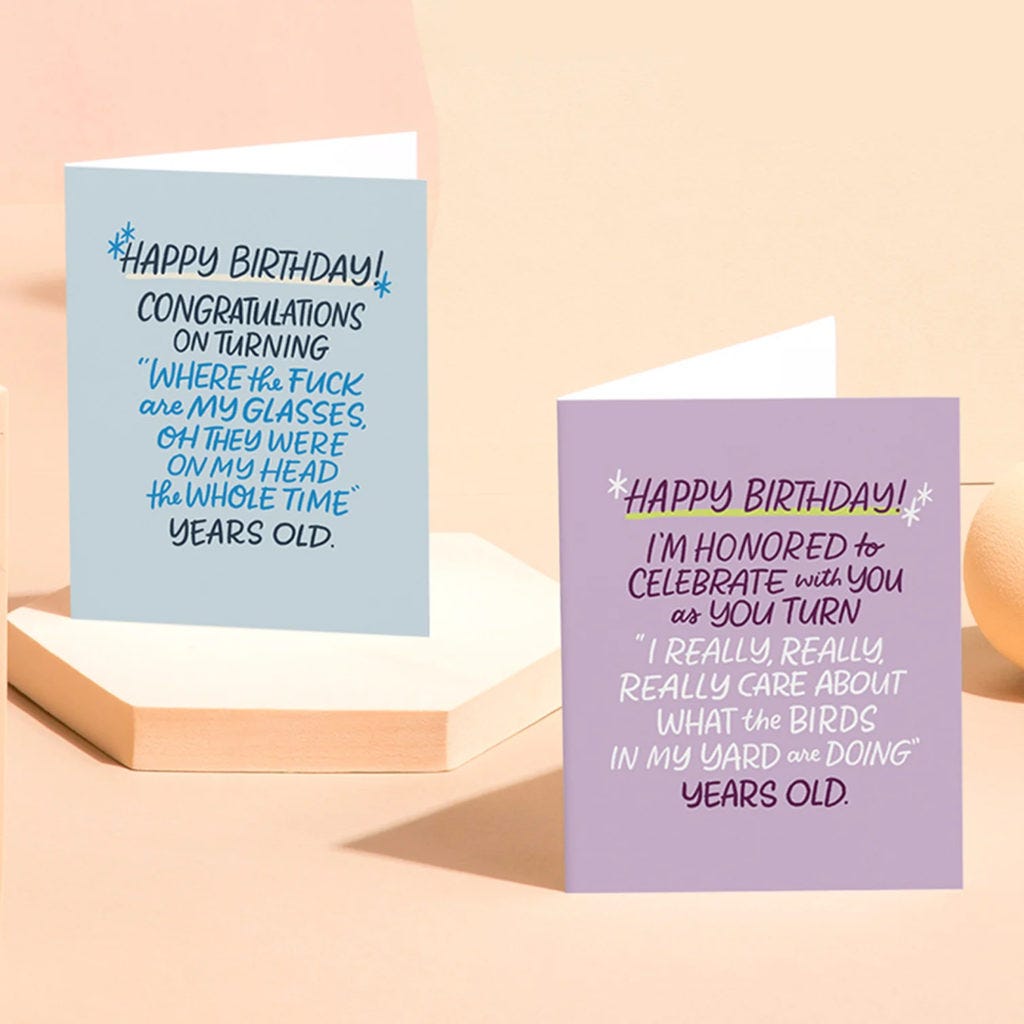
Now Emily is taking her talents to another often misunderstood and little-acknowledged life phase, with Em & Friends’ first-of-its-kind perimenopause and menopause tracker journal (in collaboration with sister company Knock Knock). Emily learned firsthand about the importance of acknowledging her needs. A writer, illustrator, speaker, teacher, brand strategist, creative director, podcast host, and entrepreneur, she’s currently in a part-time role as a consultant since Union Square Publishing bought her company in 2022. After a bout of burnout, Emily’s in a period of slowing down, figuring out what’s next, and learning to get comfy in this uncomfy–but necessary–liminal space. She always articulates perfectly what we all wish we could express and it was a delight to interview Emily and discuss the Menopause Tracker Journal, the benefits of quitting in a productivity-obsessed culture, taking a break from social media, and the joys and challenges of mid-life.
Em & Friends now has a Menopause Tracker Journal, which is physician-approved and the first of its kind! There are so many planners and journals out there, but surprisingly — or not — there hasn’t been one for perimenopause and menopause. What inspired this project, and can you tell me more about this amazing tracker?
The tracker was actually a labor of love from the joint Knock Knock and Em & Friends editorial teams, and the majority of it was written by Knock Knock’s founder, and our former CEO, Jen Bilik. We all really worked together to figure out what actually would be helpful for us in our own experiences, because there were five women who were all in different stages of this. What did we need? What doesn't exist? You know, part of why menopause and perimenopause is so confusing and maddening is that there are so many different possible symptoms (34) and they vary so much from person to person. There are also a ton of different lifestyle changes and tweaks that actually help alleviate them, so it's hard to just keep track of all of those things. The intention is to help people figure out what's actually going on with their bodies, recognize patterns, and get clear on what helps and what doesn't. We’re not doctors and it was really important to have it fact-checked by an actual menopause specialist, so we had it checked by Dr. Heather Hirsch, a menopause care doctor in Boston.

Amazing. It feels like there was so little talk about perimenopause and menopause, and it finally feels a lot more prevalent now. I'm 40 and I think I just actually heard about perimenopause five years ago — I didn't even know the word.
Me either. I’m 47 and I didn't know the word until I was in my late 30s. I basically had started early and I'm done now. I really didn't understand this whole transition period, that it was gonna last eight years in my case, and that it would be this disruptive thing that was a really big deal. I didn't know what to expect at all, so I'm really glad that it's finally starting to get some traction in the media. I think that Gen X is the first generation that’s willing to talk about [perimenopause]. It's been so understudied and under-resourced. I'm seeing this sudden proliferation of people selling products, like sort of leveraging menopause to sell special creams and turmeric. And, awareness is cool, but also, I really hope that this brings medical research and training to medical school, literacy among doctors, and an overall education focus, instead of just making brands which is what Americans really like to do.
You're right about older generations; they didn’t talk as publicly about things like menopause or miscarriages or mental health. There's much that has become more normalized…I saw an Instagram post the other day that stated, “Menopause Ruined My Marriage.” It's a bold headline, but when you have such dramatic mood shifts, you might just think you're losing your mind.
When I first started posting on Instagram about menopause, the number of women who commented was no joke. It was 800 comments, and I never got 800 comments. There were so many people that said "I really thought I was going crazy. I thought I was dying, I thought that there was something terribly wrong with me. I was afraid to go to the doctor because I was sure that I had a horrible disease." And yeah, it's a strain on marriages. My mental health has absolutely been affected by all the hormonal transitions. It's tough for so many people — and then also, some people just don't even feel it. It's frustrating because no one can tell you with certainty what it will be like for you. It's like, okay, yes, this happens to anyone who was born female. Good luck. Beyond that, you're on your own; it can last between one and eleven years; and you're gonna have all the symptoms or none of the symptoms. One in five OB-GYNs get menopause care training, one in five. It happens to 100% of their patients.
You’ve stepped back from Em & Friends, and from work in general. You also co-hosted a podcast, Quitted, which explores the times quitting is necessary to survive or thrive, although it means letting go of huge parts of your identity. We hear about the benefits of hustling and growing but what are some of the benefits of quitting?
It's been a really interesting process. I'm consulting part-time for Em & Friends right now, so I'm working half-time. And that's a huge shift for me because I worked 60-to-80-plus hour weeks for 20 years. I worked in advertising prior to starting Em & Friends, and then started Em & Friends in 2012. I've been going through some medical stuff these last six months, so the half-time is a good thing because I don't know how else I would do this. The timing has worked out.
The Quitted podcast came about because my good friend, Holly Whitaker, had also started a company that was based on something that she really loved and was passionate about — it was a recovery company — and then she ended up leaving that company. We started it as a way to talk about this process of undoing, and the courage it takes to leave things behind that aren't working, or that are no longer aligned with the person you’ve become. Most of us have made choices along the way according to cultural values and norms, whether it's staying in a religion that we were raised in, or doing a job that we thought we were supposed to because we were good at it, or being in a marriage that made sense on paper but that wasn’t great.
Our culture really equates perseverance with virtue, and it places so much value on not giving up, but if you're in a situation that goes against your true nature for any long-term period of time, the only way to thrive is actually to get out of that situation. It's super lonely and ungrounding and difficult to leave what you know, and there is a period that comes after that, which I'm still in now, that’s pretty tough. But quitting gets you closer to a life that's in alignment with who you really are. So I think that it's worth having these conversations about quitting and the transition, whether it's something you've quit, or whether it's something that's happened beyond your control. Our culture just really focuses on perpetual growth and perpetual output, and that is really not possible. In the space of a life, you're going to have setbacks, and you're going to have grief, and you're going to have these periods where you don't know what the fuck you're doing and you feel totally lost.
For me, I lean very hard right now into this Buddhist idea that suffering is the result of believing you're having the wrong experience. You're thinking that the experience you're having is somehow wrong because it's unpleasant or hard. When you fight and struggle and try to get out of that place, it's also what makes it worse. Trust that things will shift when it's time for them to shift. We’re also very much an instant gratification culture — we’re all conditioned to force our way forward and to expect results and this is one of those things that takes time. So much of the work is trusting that you're not going to be in this place forever; you're not going to feel lost forever; there will be the next thing, it's coming, you can't see it yet, and that doesn't mean it's not on its way.
The irony with Quitted is that we did 20 episodes and put it on pause last July, because I wasn't ready to do it. What I was trying to do with Quitted, which I didn't really realize until we got into it, was that I was trying to use that show as a means of going directly from one identity to another. And kind of avoiding that messy, shitty part in the middle when you feel totally lost and dead inside. It turns out that I couldn't do that and I wasn't ready to do anything yet. We may bring it back; Holly and I are still super close. Right now, I'm focused on health and practicing a very different way of being. For 20 years, I forced myself to constantly be creating. I feel like I sort of strip-mined or factory-farmed my creativity and I'm not going to do that anymore. I'm in a space of exploring what's here instead and it doesn't look like content; It feels much more interesting to me right now to not try to package it into content for the world.
It feels like a big practice when you're so used to doing one thing. It's probably almost a daily reminder to not try to work, be productive, and go the old route…
It's terrifying, right? Because what feels familiar also feels safe in our brains, and so it feels deeply unsafe to my nervous system to not be running those same patterns, and to not be doing things in the way that I’m used to doing them. A lot of the ways that I was used to doing things were created because it gave me a sense of control, even though it's all kind of bullshit anyway, but it gave me a sense of safety and control. It's a real constant practice and I have a morning routine. I really am working hard at it, but in a different way than I used to work.
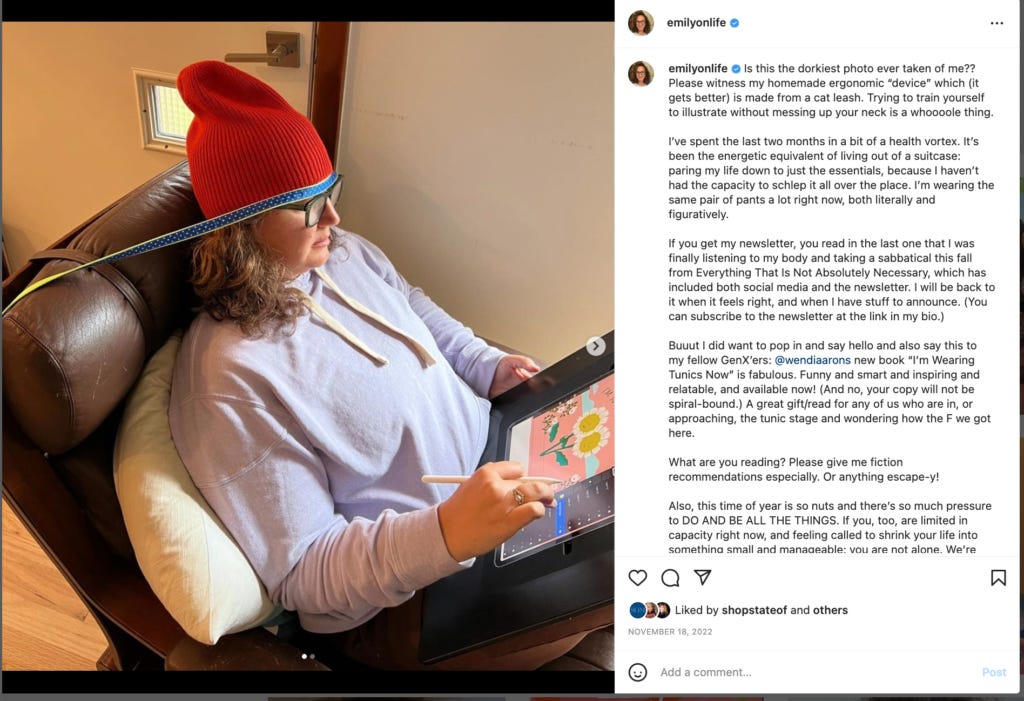
You took a social media pause as well. You’ve mentioned the bizarre nature of being a brand and commodifying your personality and the conflict of being consistent within those brand parameters when humans are changing beings. What is your relationship to social media at this time?
Like 18 months ago or so, I just realized that I don't really enjoy looking at Instagram anymore and I don't feel super compelled to participate in it. I was really publicly online for about eight or nine years. Part of that means that I had so much stuff go viral. I've had the experience of having so many likes and shares and all that. Eventually, I just stopped getting a dopamine hit from it. Eventually, it was like, OK, I've done this. I feel like social media just stopped delivering. I'm also craving less input and less output; I don't want any more hot takes; I don't want my hot takes. Also, I'm an artist and a writer. I don't want to make videos. Not my thing, you know?
I think social media is a really useful marketing tool. It's an effective way to reach people. Also, I have nothing to market right now. I also don't want to be at the mercy of an algorithm to reach the people who want to see my work. The changes that they've made over the last few years are just depressing for anybody who's any kind of creator. I go back and forth. This is a necessary evil for getting work out there and for a long time it was required as a creative person. It’s how you get a book deal. It's not just nice to have, but it's literally how publishers evaluate you now, and how you have opportunity. Having an audience is the first thing that so many people ask about when it comes to opportunities for creatives. But whatever I do next, I really want to figure out a way to make social media not a requirement for my job in order to be able to make a living.
If I'm gonna put my time into something, I’m much more interested in writing an email newsletter, and using Instagram as a tool to try to get people to sign up for that and connect with me there — because that said, I do really appreciate so many of the people who follow me on Instagram and I've made actual rad, true, real-life friends from people that I met on Instagram.
Absolutely. What are the most challenging things and the most joyful things about midlife?
Midlife is heavy, you know. You have breadwinning responsibilities for your family. You have your caregiving for both children and elderly parents. You have career exhaustion. So many of us have been working since we were teenagers in these demanding careers in a time when leaning in was held up in our culture as a model that we were supposed to aspire to. So 20 years later, we're freaking tired, and we're nowhere near retirement age. We're looking around like, Oh my god, I can't work this way for 20 more years and also take care of these kids, deal with these elderly parents, and somehow save for retirement. I feel like I just finished paying off my college loans. And, like we were saying, menopause is also no joke and a lot of these symptoms can feel really debilitating for years, and it hits right in the middle of all of this other stuff, like parenting teenagers or parenting kids of any age. The heavy responsibility has felt like the most challenging thing for me.
But then there are really big joys, like I don't give a fuck what people think anymore. Things that used to bother me when I was younger just don't. I am way more clear on my priorities. I'm way more comfortable with who I am. I don't get FOMO. I don't stress out over not being invited to things or not having something to do on a Friday or weird friendship politics. There's so much less drama. Life is much more peaceful than it was when I was younger.
This publication aims to reinvent the 40s. What midlife myth do you want to bust or what do you think is an important reframe for women in their midlives?
There's an idea that midlife is this entry point to irrelevance because we have this culture that's so fixated on youth and we're supposed to be sad about that. But the way that I look at it is that we live in a sick society. Our society is fucked up and the older I get, not only do I care less about not being able to fit into our society in a certain way or get our culture’s stamp of approval, but I also realize that I don't actually want to. There's a quote by Krishnamurti: “It is no measure of health to be well-adjusted to a profoundly sick society.” This whole thing about how we slide into irrelevance and we slide into obscurity and we become unnoticed and all of that is like, Well, I get to fly under the radar. I don't have to pretend to participate in this anymore.
And, I'm not dressing for men anymore. A lot of people have this idea of giving in to aging and like, I'm not going to try to be sexy anymore. And all of those ideas about what those things are — like what sexy even is or what attraction even is — we get to rewrite that and we get to just leave it behind and decide for ourselves what we want to wear, what we want to look like, what we like, what we value, and what we care about. We get to really redefine things and exist outside of this whole pressure cooker of: do this, don't do that, damned if you do, damned if you don’t.
This interview was originally published published here on Jumble & Flow.


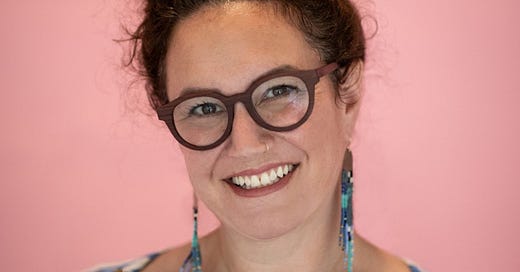



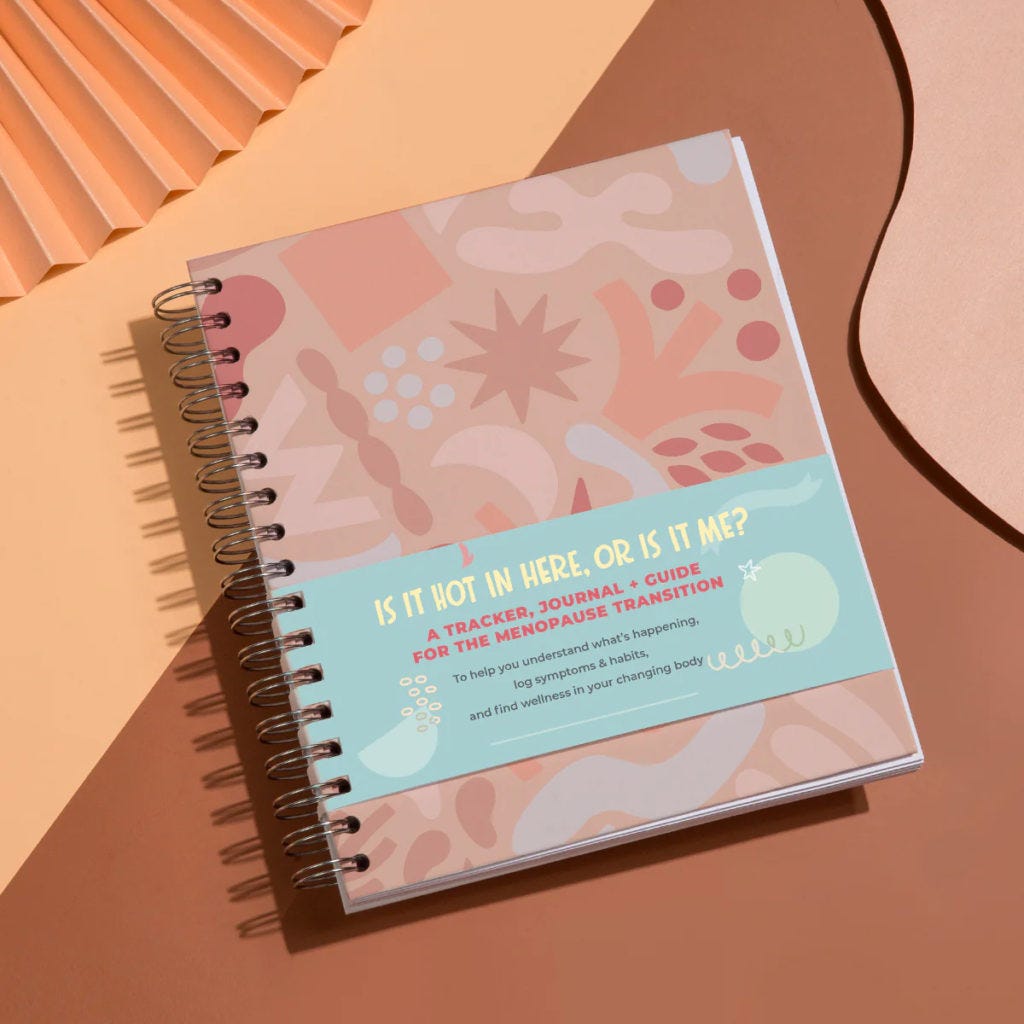
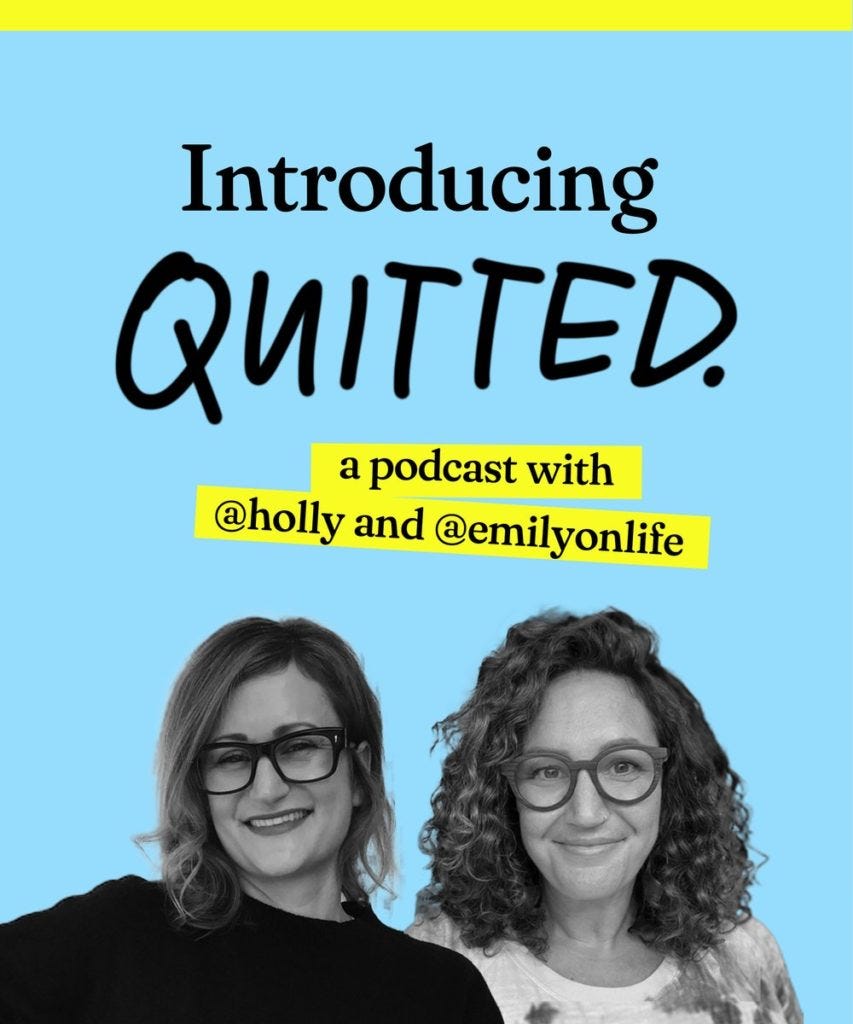
GREAT interview with lots to think about! One standout quote: 'I'm also craving less input and less output." I've also become pickier and don't get a "dopamine hit" from the same things I used to. I liked how Emily explained it all.
And I love the Menopause Tracker Journal. I need that! When things start changing, it's really hard to keep it all in your head. And I find those digital period trackers kinda creepy — as do a lot of younger women I know.
It's wonderful to see this go live! Emily is a treasure and I loved talking to her. Thank you publishing this (and making it look so beautiful)!